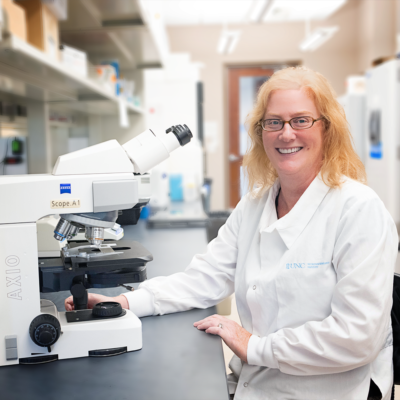by Priscilla O’Neil
Sandra M. Mooney, PhD, specializes in brain development or developmental neurobiology. Her work is specific to how nutrition and alcohol affect brain development and whether that changes behavior. Current studies explore how nutritional needs change after alcohol exposure, thereby increasing the chances that modifying, or personalizing, nutrition will optimize growth and development. She took a circuitous route to this line of study, but it was a likely outcome given her experiences.
Mooney went to school in her hometown of Dunedin, New Zealand, attending the University of Otago. She went to college thinking she wanted a degree in psychology until one day in class when a professor talked about a study where they could not define the outcome they were looking for. “I still remember walking out of the lecture,” she said, “and asking people: ‘How can you measure something if you cannot define what you are measuring?’” This question, coupled with an opportunity to be part of the university’s first neuroscience program, changed her course of plans. Out of the five students starting the program, only two graduated and Mooney was one of them. She went on to become a scientist investigating the effects of environment and genes on brain development and behavior.
Her early work experiences contributed to Mooney’s interest in understanding human behavior. Working in a restaurant kitchen, sandwich shop, shoe shop, library, as a waiter, hotel maid, and lab technician she came across people from all walks of life. They gave her an appreciation of a good work ethic as well as the enormous variety in human experience, and she learned how to work with all sorts of people. Now she says that some days she feels that she has learned a lot and made progress, while on others she realizes there is still much more to learn and explore.
It is this fascination with knowing how people think and behave that drew her to her current field of study.
“We are all products of our experiences and environment, and these can affect our memories and the brain’s structure and function,” she said.
Yet, the question remains: How does this happen? And if the brain has been affected by something that can compromise it, like alcohol, can we do anything to help it work better?
Mooney and her research team are currently looking at various nutrients to see if any can improve brain function and behavioral changes caused by fetal alcohol exposure. She especially encourages pregnant women to be aware of the alcohol consumption they ingest. “Exposure to alcohol as a fetus causes permanent changes in the brain and the body,” said Mooney. “There is some hope, but we probably can’t get the brain back to completely normal, so no alcohol exposure would be best.”
As for brain health throughout life, Mooney says that when eating well, exercising, and seeing a doctor for treatment of diseases are put into play, “these can be good changes that should protect us as we age.”
On the contrary, negative habits such as eating a poor diet are associated with metabolic changes, including type 2 diabetes and obesity, and “these can be associated with cognitive decline.”
Mooney’s advice for maintain a healthy brain includes doing daily things like eating vegetables. “Vegetables are our friends,” she said. Also, “keep socializing and work on balance—falls are a big problem as we age. Exercise your brain and try to keep things in your life that you are interested in.”
Read more about Sandra Mooney’s research.

